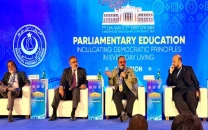Imran may ‘represent’ himself in court
SC issues written order in NAB law tweaks appeals

The Supreme Court on Saturday -- in its written order in the appeals in the accountability law amendments case -- held that the incarcerated respondent, PTI Chairman Imran Khan, could be allowed the chance to represent himself if he wanted to.
It also directed that the deposed premier should be provided with the copies of the intra-court appeals through the superintendent of Rawalpindi’s Adiala Jail, where he was currently imprisoned.
“If he [Imran] wants to be represented [in the court] the jail superintendent should do the needful,” the order read.
A Chief Justice of Pakistan Qazi Faez Isa-led larger bench, which included Justice Aminuddin Khan, Justice Jamal Khan Mandokhail, Justice Athar Minallah and Justice Syed Hasan Azhar Rizvi, heard the case on October 31 and allowed the accountability courts to continue their proceedings in corruption cases.
However, it stopped them from giving the final orders as it heard the first-ever two intra-court appeals against its September 15 majority verdict, which struck down the amendments to the country’s anti-graft law.
The first intra-court appeal was filed by the federal government and the other by former Sui Southern Gas Company (SSGC) managing director Zuhair Ahmed Siddiqui.
In the written order, the SC ruled that until the next date of hearing, the accountability courts could proceed with the trials but would not announce the final judgments.
The SC adjourned the hearing of the case until issuance of the detailed judgment on the Supreme Court (Practice and Procedure) Act, 2023 -- a law aimed at limiting the discretionary authority of the top judge.
The order read that Section 4 of the Practice and Procedure Act stipulated that ‘where [the] interpretation of the constitutional provisions is involved’, a bench of this court comprising of not less than five judges must hear the case.
It added that the Saad Mumtaz Hashmi, representing the federal government in the first intra-court appeal, argued that in violation of the Act, the majority of a three-judge bench of the SC, instead of five, in a judgment dated September 15, 2023, decided that most provisions of the amendments were unconstitutional.
The order further stated that the contention of Hashmi was supported by Attorney General for Pakistan (AGP) Mansoor Usman Awan and senior lawyer Farooq H Naek, who was representing Siddiqui in the second intra-court appeal.
It pointed out that though the 3rd amendment was in the field when the case against the tweaks was being heard and “six hearings took place after its promulgation yet the [September 15] judgment did not attend to it”.
“The [September 15] sustained the question of how trials will proceed when proceedings before other (non-accountability) courts had taken place, and reference is also made to Sections 231 and 350 of the Code of Criminal Procedure, 1898 and Section 35 of the NAB [National Accountability Bureau] Ordinance, and it is stated that the 3rd Amendment had attended to matters as mentioned in [one of] these intra-court appeals, but the impugned judgment does not address the 3rd Amendment, which has created an anomalous situation,” it continued.
In June 2022, the PTI chief challenged the amendments to the National Accountability Ordinance introduced by the previous PML-N led government in the SC, arguing that the tweaks would pave the way for public office holders to get away with white-collar crimes.
The PTI chief filed a constitutional petition against the amendments under Article 184(3).



















COMMENTS
Comments are moderated and generally will be posted if they are on-topic and not abusive.
For more information, please see our Comments FAQ